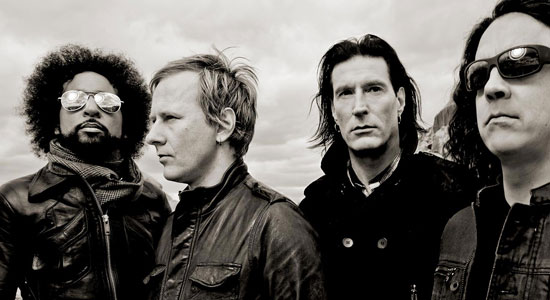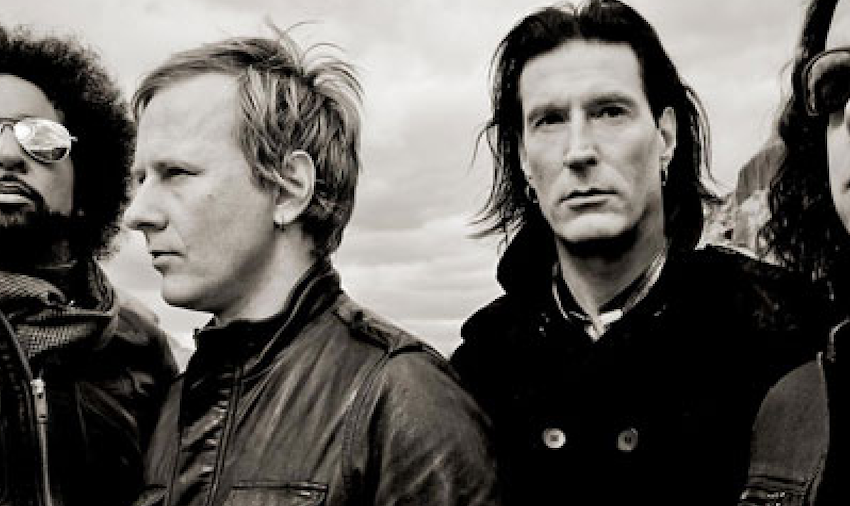
The devil’s in the details of Alice In Chains’ unlikely comeback
Jerry Cantrell doesn’t always take a shine to interviews, and really, who can blame him? It’s been a long hard road for the guitarist since Alice In Chains formed in a helter-skelter Seattle warehouse a quarter-century ago, a path littered with ominous magazine cover stories and rock journos asking as many questions about the excesses that swirled around the band as its music. But as the 47-year-old drives home from a meeting at Capitol Records just off Hollywood and Vine, he’s laughing and good-naturedly bitching about the logistics behind this summer’s tour. Maybe Cantrell’s excitement about Alice’s forthcoming full-length, The Devil Put Dinosaurs Here, has him in such a cheery mood. Or it could the subject matter he’s discussing, one of his favorites: destruction.
“You always have to start from fucking zero,” he says of the tearing-down process that precedes a new album. “The trick is forgetting that record. That’s over. We start from zero and say, ‘Let’s see what we can pull out of our asses.’”
Few bands survive the reboot Alice In Chains launched in 2008, six years after the death of its troubled powerhouse singer, Layne Staley. Cantrell admits the idea of reemerging from stasis with a new vocalist, William DuVall, felt like a gamble. “At the beginning, there wasn’t a whole lot of overwhelming support,” he says. “It was more of answering questions for ourselves, not for anyone else.”
The result was Black Gives Way To Blue, a work worthy of standing alongside the band’s masterpiece, 1992’s Dirt. Though few would have predicted such a return to form, the album was certified gold, topped scads of best-of lists and launched two full tours.
“It couldn’t have gone much better,” says Cantrell. “We did everything we wanted to do. We made a record we’re proud of, we reconnected with people, and we reignited the band and restarted our lives again. After that, it’s like, ‘OK, where do we go from here?’”
For DuVall, a veteran of the Southern hardcore scene that spawned Corrosion Of Conformity in the ’80s, that was a mind-bending riddle to solve, especially after playing to 70,000 in Brazil and headlining Madison Square Garden with his new mates.
“I’d gone to New York for years,” says the 45-year-old of his road-dog days with former bands, “and the running joke, especially when you’re touring in a broken-down station wagon, was when you passed the Garden, you say, ‘Drop me off at the gig.’ And this time, it really was the gig. You walk around the halls backstage and see all those framed pictures of everybody who had an impact, from the Stones to Muhammad Ali to Bob Dylan. It was joyous.”
The accolades and ecstasy delivered something unexpected when Alice headed back into the studio—a newfound sense of freedom. “On this record, the question of our very existence, at least, was settled,” says DuVall. “At that point, we’re not fighting for our right to be. That does allow for a smidgen of relief. Then there’s all the other stuff you put yourself through the paces about. Like the music.”
The Devil Put Dinosaurs Here stays true to the Alice In Chains sound, a dense shroud of gloom occasionally lifted by soaring harmonies and delicate riffs. For every dirge stomp like “Pretty Done” and the menacing creep of “Lab Monkey,” there are echoes of Jar Of Flies’ haunted acoustic beauty (“Voices,” “Choke”) or the filthy groove of “Stone,” the album’s second single. It’s also evidence of a step forward for the band, beginning with the message behind the title track.
“I’ve heard people say it and truly believe it—the devil put dinosaurs here to fool ya so you’ll believe (in evolution) and not go to heaven,” says Cantrell. “If what you believe in is teaching you to hurt somebody or tell somebody what they can or cannot do with their body, to legislate against somebody or enforce a prejudice—like the fuckin’ hate group God Hates Fags (Westboro Baptist Church)—it’s like, ‘Really?’”
For a band defined by turning its withering gaze inward, the song—and the decision to use it as the album’s title—is Alice’s boldest statement to date about the world it inhabits.
“We’ve always kept what we’ve had to say a little more veiled,” says Cantrell. “We had a few meetings about it—do we want to fuckin’ take this shit on? We’re not trying to make a campaign out of it. Sarcasm is a highly prized commodity in the Northwest. The song is said with a healthy dose of that.” Cantrell points to the chorus—“Jesus don’t like a queer/No problem with faith, just fear”—as proof it’s not an anti-religious screed. “We’ve got no problem with what you believe,” he says. “But fear-mongering and hindering people’s lives, that’s where you lose me.”
There’s a certain wry humor in a tune about Darwinism representing Alice In Chains’ evolution, and DuVall says his own growing pains as a frontman still make him chuckle. “I’m not a singer first—I’m a guitarist,” he says. “Anything involving moving around with a microphone and not holding a guitar—I don’t know how it happens.”
Vocally, the new album is a natural progression from the band’s eponymous 1995 release, which featured three songs with Cantrell on leads. Those duties are split almost evenly on Dinosaurs, and the harmonies are so tightly layered, it’s not always obvious who’s out front. DuVall says the illusion of a singular voice is by design. “It’s a fun game to play—how close can you get?” he says. “It sounds huge like a choir, but also like one person.”
Cantrell is best known as a guitar god, but his harmonies—and many of his lead singing efforts—have defined Alice In Chains nearly as much as his tortured solos and two-ton Iommi riffs. He says credit for pushing him further into the spotlight goes to his old songwriting partner.
“That started with the vocal sound Layne and I created together,” he says. “The more we went along, the more confidence and encouragement he gave me to sing some of my songs. It’s still something I have to work at very fuckin’ hard, especially when I’m standing next to someone as fuckin’ badass as Layne was. And William—he’s a pure singer. (Chris) Cornell, that’s a fuckin’ singer. I can’t do that shit.”
Thanks to DuVall, Alice In Chains also has a two-guitar attack in its arsenal. There’s no denying Cantrell’s leadership—he handles the bulk of the song- and lyric-writing duties—but on standout “Phantom Limb,” DuVall tears off his first solo. It’s the grunge equivalent of joining Led Zeppelin and hearing Jimmy Page tell you to take a bow. “He comes up with some really great riffs,” says Cantrell. “It’s important to for him to inject himself into the thing. It’s been good, especially live.”
Perhaps the only downside to growth is growing older, something Cantrell faced when opting for shoulder surgery in 2011 and delaying work on Dinosaurs for months. “It’s a repetitive motion injury,” he says. “You have a nice fuckin’ bad-posture slouch onstage and you’re working your arms and headbanging. That shit wears you out. A lot of my friends—Jason Newsted from Metallica, he’s had both shoulders done, same as me. He even had to do one twice. Dave Mustaine had his neck fused. Ed Van Halen’s got a fake hip.”
As Cantrell laughs at the perils of being an aging rock deity and DuVall talks of ramping up his strict pre-tour workout routine, one can’t help but think of the time when Alice In Chains was both defined and nearly destroyed by its demons. The band exists in a different place now, yet Cantrell still stands by his definition of Alice In Chains from nearly 20 years ago—taking something ugly and making it beautiful. “You can’t have one without the other,” he says. “You gotta go through the bad shit to get the good shit. It’s a fucking struggle. I still think that’s the case. And I’m proud of that.”
—Richard Rys






